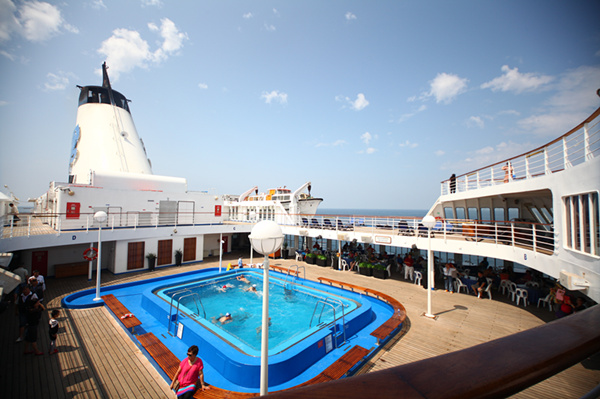
14 Dec, 2014
All-around service is key to meeting Chinese needs abroad
(China Daily) 2014-12-13 – HNA Tourism Group made an interesting observation on its cruise ship Henna: While Western cruise-ship customers love lying on the deck taking in the sun, many Chinese travelers follow a decidedly Chinese pursuit and gather to play mahjong below deck.
So the company has prepared mahjong sets on the ship in case people ask for them. “With more Chinese tourists traveling abroad, we have to respect their special demands,” the company says.
 The luxury ship Henna owned by HNA Tourism. Photo provided to China Daily |
Henna is the first cruise ship owned by a Chinese company, and so far it has sailed relatively short distances, between Sanya and Vietnam, Tianjin and Japan, Shanghai and Taiwan and Haikou and Vietnam.
Established in Beijing in 2007, HNA Tourism operates in more than 20 countries in Europe, America and Asia, serving around 1.6 million tourists last year.
Under the tutelage of its parent company HNA Group, which operates air transportation, real estate, retail, financial services, tourism and logistics, HNA Tourism has quickly grown into a tourism service conglomerate operating airlines, cruises, financing platforms and hotels.
The brands it operates include Capital Airlines, Deer Jet, Caissa, and HNA Cruises, Hong Thai Travel Services and Tangla Hotel. Zhang Ling, chairman of HNA Tourism, says Europe is a strategic market for the company and it will seize the business opportunities that come with the influx of Chinese tourists.
Recently, the group increased its stake in the hotel group to 29.5 percent, becoming the biggest shareholder.
Its hotels will provide rooms for HNA Group’s subsidiary company HNA Tourism Group. HNA operates more than 380 hotels in 26 countries, with more than 60,000 rooms.
HNA Tourism is ranked No 6 on the list of top 20 Chinese tourism companies, the third consecutive year that it has been on the list, the China Tourism Academy says.
Apart from cooperating with NH hotels (a Spanish hotel group), HNA Tourism is also building a Chinese hotel brand, the Tangla, serving premium Chinese travelers.
Yang Jianhong, vice-chairman and CEO of HNA Tourism, says a Chinese-operated hotel definitely knows more about Chinese customers’ needs, and the authentic Chinese ambience may also attract more Western customers.
The first Tangla hotel opened in 2009, and there are now 10 in China and abroad, including in New York and Brussels. The company says it plans to open another 10 worldwide soon.
Even as many tourism groups have been divesting themselves of properties, HNA Tourism has been on a spending spree. It vaunts a seamless service network including online booking, accommodation and online payments. The group now has holdings in Hong Thai Travel Services, Aberdeen Tours in the US and Caissa Touristic of AG, a German-based travel agency.
In June, HNA Tourism’s assets were worth 110 billion yuan ($17.9 billion), and revenue in the first half of the year was 15.6 billion yuan.
“With hotels and airlines under the same umbrella, HNA Tourism can offer lower prices, including cheaper packages for customers traveling to Europe,” Zhang says.
In 2012, HNA Group bought 48 percent of the French airline Aigle Azur and became its second-largest stakeholder. Aigle Azur operates 12 aircraft in France and Algeria and carried 1.8 million passengers in 2011.
“France is a major tourism destination for Chinese tourists, and by buying a stake in the company we have better coverage and visibility in the country,” the company says.
Earlier this year, Hainan Airlines launched a flight from Hangzhou to Paris. This is the fifth route to Europe that HNA operates after it had launched flights to Moscow, St. Petersburg, Brussels and Berlin.
Caissa Touristic spearheads HNA Tourism’s European expansion. Last year Caissa China’s tourism products to Europe accounted for 17 percent of China’s total travel business to Europe.
“There are three major elements in a tourism company: travel agencies, flights and hotels,” Zhang says. “After we bought Caissa in 2011, our agencies have become stronger. Caissa is a Germany-based company and has valuable assets in Europe, which is good way for us to enter the European market.”
The European tour agency also works as a barometer of airlines. When the agency shows that travelers’ numbers are ebbing, the airline can reduce fares to attract more customers, and when demand returns, they can be brought up.



Liked this article? Share it!